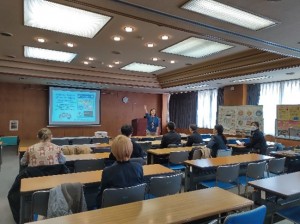Visited Nagoya City Kita Ward Office to Learn Their Activities on Utilizing Data from a “Community Assessment”
On March 19, 2024, together with two invited guests from Brunei Darussalam and an officer from the WHO Western Pacific Regional Office, to learn their activities of utilizing data from a “Community Assessment” conducted by Kita Ward, Nagoya City. They do some unique activities to empower the health and wellbeing of the elderly people living in the community. We observed initiatives in which people are voluntarily planning and implementing activities for the better health and wellbeing of the community residents including the elderly.
Before this visit, a workshop on “Community Assessment” was held at the Kyoto University School of Public Health (KUSPH) for three days on March 14, 15, and 18, 2024. After enhancing our understanding of the theoretical and analytical aspects of “Community Assessment”, we visited Kita Ward office, to learn how “Community Assessment” data is utilized in local initiatives in practice.
We received an explanation from the Nagoya City Kita Ward Office about resident-led workshops using the “Health and Connections Town Chart” that are being held in some of the school districts. In the workshops, local residents took the lead in discussions, and based on JAGES’s “Community Assessment” data, they discussed what kind of activities they would like to carry out and created a plan, and some of them are actually implemented. Examples of activities include: (1) Niko-Niko (Smile) Coffee Shop (Using the conference room of a local library, to provide a gathering place with coffee for the community-dwelling elderly about once a month), (2) Creating a school district homepage, and (3) Holds a market event at a shrine (Each group will set up tents/booths to sell goods and introduce their activities), 4) Implementation of “health and Connections Community Cleaning” event (This creates opportunities for elderly people to go outside and interact with others through cleaning activities.) The participants enhanced understanding of the activities that have been newly planned and implemented as the outcome of the workshops using “Community Assessment” data.
